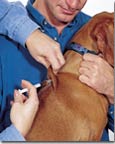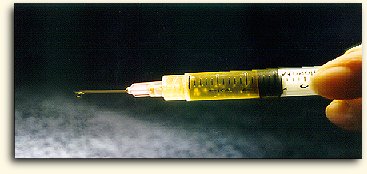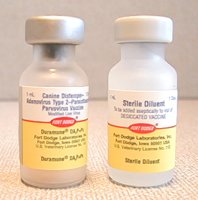Vaccines for Less
|
|||||||||||||||||||||||||||||||||||
|
|
|||||
 |
 |
 |
 |
 |
 |
| 1. Tighten the needle on the syringe and insert it into the liquid vial. Withdraw all the liquid. | 2. Inject the liquid into the vial that contains freeze-dried or powdered portion of vaccine. | 3. Remove syringe and shake vial as shown for a few seconds to mix well. | 4. Insert needle and withdraw entire mixed contents. The vaccine is now ready to give to your pet. | 5. Most vaccines may be injected just beneath the skin. For dogs the best area is the loose skin on the back of the neck. Simply lift the skin, insert the needle, pull back slightly on the plunger to be sure the needle is not in a blood vessel (if it is, blood will enter the syringe), and then administer the vaccine. If blood in the plunger when you pull back, try another location. If air appears in the needle, it means your are not yet into the skin. This method is called subcutaneous vaccination. |
6. Use needles & syringes only once. With any vaccine or injectable medication, always use a separate sterile needle and syringe for each injection. Safely dispose of all used syringes and needles (please break the needles and place inside a hard plastic bottle with a screw-on lid. |

Where to get vaccines
Revival Animal Health (http://www.revivalanimal.com) sells a wide variety of dog vaccines and sells them as individual shots as well as in dozen lots. All vaccines are shipped in a polar box with ice packs. Fort Dodge brands are made by Wyeth, but other brands are carried as well -- Intervet, Schering Plough, Neopar, and Biocor. Most other online veterinary and dog supply places also carry vaccines: Lambriar (http://lambriarvetsupply.com/index.pl), Countryside Vets Supply (http://www.countrysidevetsupply.com), Valley Vet ( http://www.valleyvet.com ), http://www.dresslersdog.com or any of the other general pet catalogues (see links section of this web site).
Types of vaccines:
Rabies vaccine (Fort Dodge Rabvac 3 by Wyeth) is a killed rabies vaccine and good for more than three years and is sold by Revival Animal Health (http://www.revivalanimal.com). You inject subcutaneous 1 ml dose at 3 months of age or older, revaccinate one year later, and then every three years from then on. Product 61-942 is a 10 dose bottle for $9.95 (see http://www.revivalanimal.com) This rabies vaccine is sold for pet protection, not for licensing, and is not sold in AK, AL, AR, CA, CT, GA, HI, IA, ID, IL, IN, KS, MD, ME, MN, MO, MT, NC, ND, NJ, NM, NV, NY, OR, RI, SC, TX, UT, WA, WV, WY., so if you want to save money and live in the wrong state you may have to coordinate with a friend. States where it can be shipped include Virginia, Pennsylvania, Delaware, New Hampshire, Florida, Nebraska, Tennessee, Michigan, Colorado, and many others. Revival Animal can be reached by phone at 1-800-786-4751. Most animal shelters also offer very low-cost rabies vaccines -- call to find out their vaccine schedule.
Puppy Protector Shots: Revival Animal Health sell several types. The Fort Dodge brand is a 5-way combination shot that covers Canine Distemper, Adenovirus (killed) and Parvo. Give 1 ml dose to healthy puppies at age of 9 weeks, and again at 14 weeks. Product 11-160 is a 1 dose series for $2.95. Another brand they sell is Progard Puppy DPV which is Product 31-143, and a single dose is $2.25.
Canine 7 Ultra: This is sold by Revival Animal Health and is a 7-way combination shot that covers canine distemper, Adenovirus Type 2, Parainfluenze, Parvo MLV, Leptospira bacterin. Give 1 ml dose to healthy puppies at age of 9 weeks, and again at 14 weeks. Product 21-254 is a 1 dose series for $2.99 (see http://www.revivalanimal.com) Notes that Leptosprin vaccines are more likely to cause adverse reactions than all others, and some thought should be given to avoiding this vaccine.
Kennel Cough (Bordatella): Progard KC is product 31-446 in the Revival Animal Health catalogue and is sold in 10 dose lots for $16.50. This is a nostril application and can be used on pups as young as 3 weeks. An annual revaccination is recommended, but is not necessary. If your dog is not being kenneled, it does not need a bordatella dose at all.
Other things to order at the same time:
- Syringe with needle combinations can be bought at http://www.revivalanimal.com/index.cfm?Locate=1&Category_ID=170&Type_CD=DOG or at Country Side Vet Supply at http://www.countrysidevetsupply.com/countrysidepet/3ccsyrwitnee.html
Adverse reactions from vaccinations
Adverse reactions from vaccinations are very rare but they do happen. The most common reaction is a dog that exhibits with itching and head-shaking, and the presence of little ulcers or "hives" on its face and head. These eruptions on the skin are called urticarial reactions and are rounded swollen areas that have responded locally to the administration of a substance to which the dog is allergic (i.e. the vaccine). Hives are caused when the body releases histamine from a cell called a mast cell. The histamine then causes leaking of fluid into the surrounding body tissues from the small blood vessels and stimulates the nearby nerve endings producing the itching sensation. As long as the dog is breathing normally, it will probably be fine and everything will calm down in a day or two.
The vast majority of vaccine reactions in dogs fall into the previous category of "minor irritant."
It is very very rare, but a more serious reaction can also happen which is that the tracheal, laryngeal and bronchial tissues swell causing a constricted and spastic airway. Breathing difficulty can result, and life-threatening consequences can follow. In the unlikely occurrence of a major vaccine reaction of this type, rush your dog to a vet immediately.
The worst case scenario occurs when the dog or cat has what is termed an anaphylactic reaction. These hypersensitivity reactions cause a number of physiologic disturbances within the body: low blood pressure, slow heart rate and depressed breathing rate. The pet goes into a shock reaction meaning extremely low blood pressure and heart output. Blood vessels dilate lowering blood pressure, the brain is starved for oxygen and unconsciousness occurs. Though the chance of this serious adverse reaction happening is extremely low (your dog is far more likely to die from almost any thing else), it's worth having a shot of epinephrine in your medical kit, as it can also help in case of skunk toxic shock. Revival Animal Health sells a single shot of non-prescription epinephrine (AMVET brand) which contains a 1 mg dose for emergency use only in the treatment of anaphylactic shock. Go to http://www.revivalanimal.com and it's product 91-012 and 10ml is $2.95. Be advised, however, that epinephrine has to be kept refrigerated.
The most problematic
vaccine is for Leptospirosis and I simply recommend against it unless
your dog is doing a lot of ratting. I hunt my dogs regularly in
field and farm and do not vaccinate my dogs against Lepto.
Vaccines Are For Life
Once your dogs has gone
through a complete round of vaccines prior to age 6 months, your dog has
been vaccinated for life.
Let me repeat that: after the initial round of vaccines and booster shots, which will all occur before the age of 6 months, your dog will never need another vaccine again.
The only exception is for rabies, and only because that is a legal requirement. Rabies vaccines are good for three years.
Ronald D. Schultz, chairman of the University of Wisconsin's Department of Pathobiological Sciences, and the world's foremost expert on dog and cat vaccines wrote in the March 1998 issue of Veterinary Medicine :
"My own pets are vaccinated once or twice as pups and kittens, then never again except for rabies."
If your vet is trying revaccinate your adult dog for anything other than rabies, change vets.


